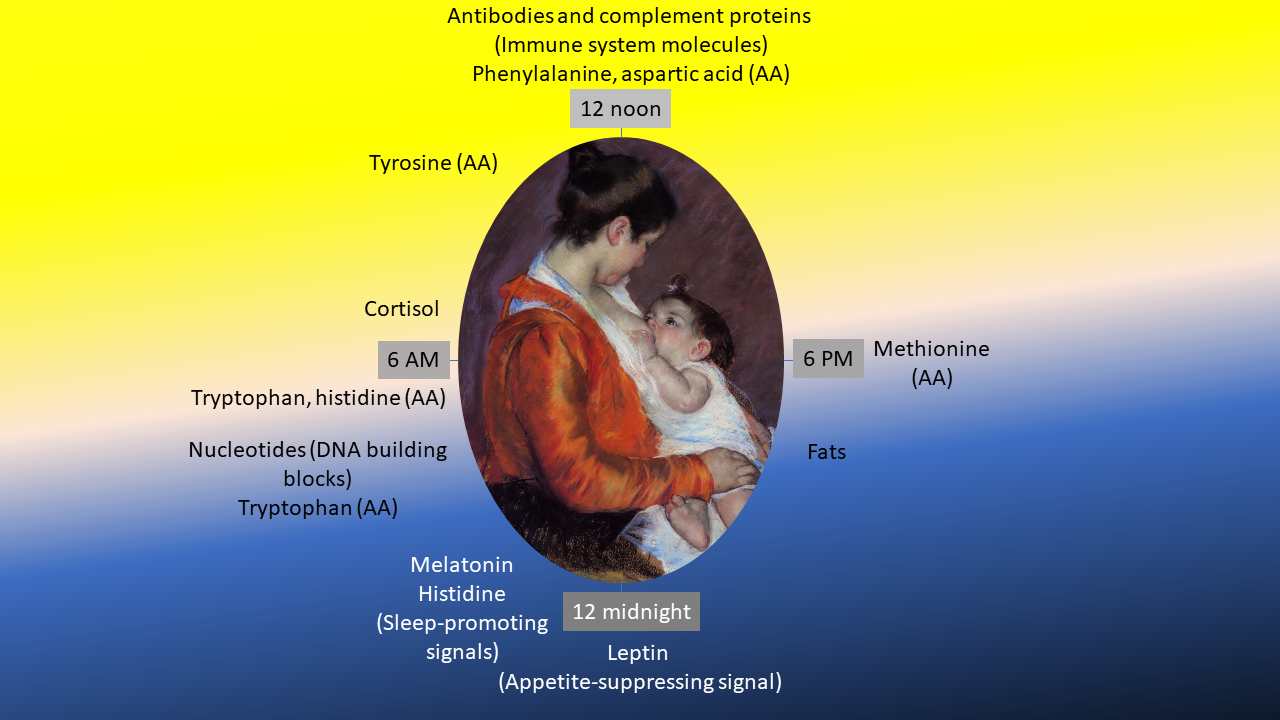The benefit of breast milk in providing passive immune protection to infants is well known. What may be less known is that the composition of breast milk changes throughout the day, following the 24 hour circadian cycle. I certainly was not aware of this when I had my children. For breastfeeding mothers who are always able to feed their babies by nursing them, this information is not particularly useful. For breastfeeding mothers who express or pump milk to feed their babies later, this information has important implications.
From a practical perspective, newborns can have difficulty adjusting to a proper nighttime sleep cycle. It turns out that the pattern of certain signaling molecules in breast milk is optimized to help newborns and nursing babies sleep at night.

Circadian changes in breast milk composition. Read more
The overall amount of fat in breast milk is highest in the evening and at night, compared with milk produced during the day. However, multiple factors contribute to the amount of fat in breast milk, especially the frequency of feeding. More frequent emptying of the breast increases the fat content in breast milk. Of particular importance for helping a baby sleep at night are two hormones and specific amino acids. A hormone, called leptin, that suppresses appetite is highest in breast milk around midnight. Melatonin and histidine are highest in the middle of the night breast milk. Histidine is an amino acid, but it is also a precursor to histamine. Both melatonin and histamine promote sleepiness. Tryptophan, the amino acid needed to synthesize melatonin, is also highest at night. Finding leptin, tryptophan, melatonin, and histidine as highest in nighttime breast milk suggests that nursing babies receive signals that minimize hunger and help them sleep.
For a mother who expresses milk to feed her baby later, it would be best to track the time the milk was expressed and give it to the baby at the same time of day. In this way, the circadian changes in the breast milk composition would match the circadian cycle of the infant. Feeding a baby day time breast milk at night could make the baby more awake at night and vice versa. Feeding night time milk to a baby during the day could make the baby sleepier than normal.
Our bodies are adapted to the 24 hour cycle of our days. It makes sense that breast milk would be similarly adapted and provide optimal components needed at different times in the day. Indeed, many of the changes mirror the changes that occur in the mother independently from breast feeding.
Mothers who pump their breast milk should time stamp the milk so that they can match the milk to the right time of the day when feeding it to their babies. Some day there may be clinically tested formulas for bottle-fed babies that better match breast milk and are customized for daytime and nighttime feedings.
Cite as: N. R. Gough, Signals in Night Time Breast Milk Help Babies Sleep. BioSerendipity (23 August 2019) https://www.bioserendipity.com/night-time-breast-milk-helps-babies-sleep/
Related Reading
J. Hahn-Holborook, D. Saxbe, C. Bixby, C. Steele, L. Glynn, Human milk as “chrononutrition”: Implications for child health and development. Pediatric Research 85, 936-942 (2019). DOI: 10.1038/s41390-019-0368-x PubMed
Other Articles about Circadian Biology in BioSerendipity
N. R. Gough, The Benefits of the Early Bird Special: Insight into Fasting and Longevity. BioSerendipity (12 September 2018) https://www.bioserendipity.com/the-early-bird-special/
N. R. Gough, Why is heartburn common at night? BioSerendipity (25 July 2017) https://www.bioserendipity.com/2017/07/25/why-is-heartburn-common-at-night/.

